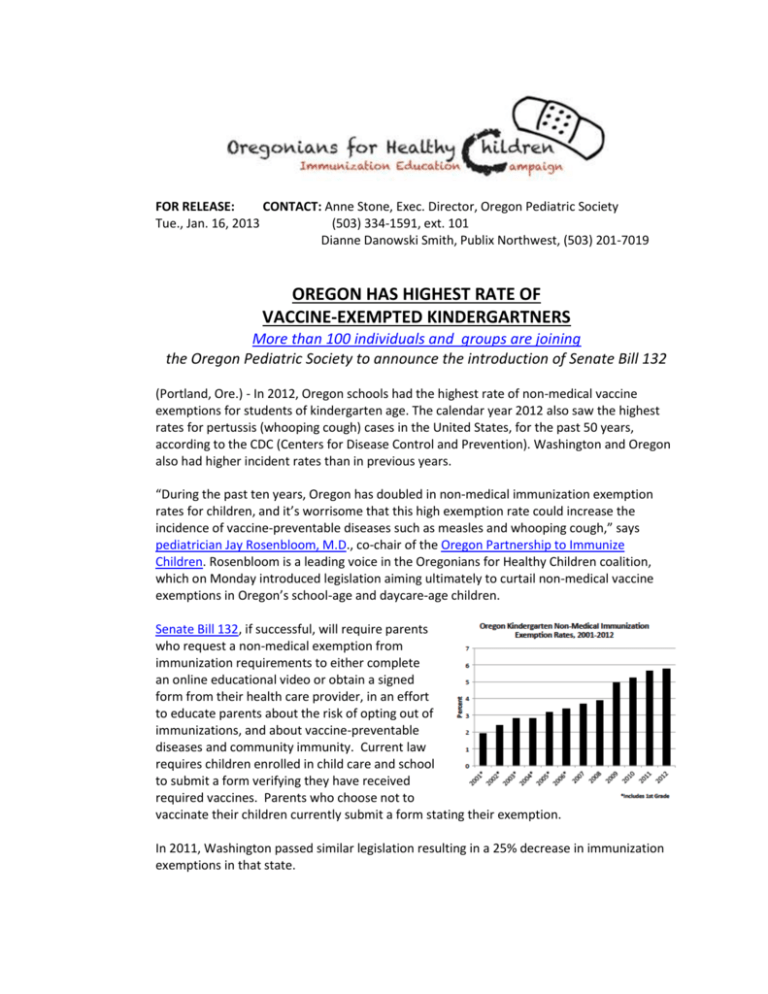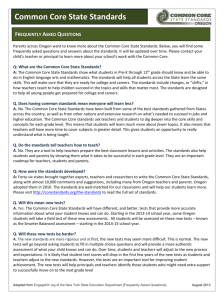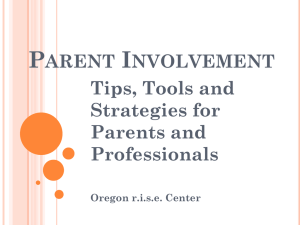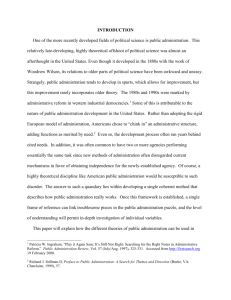Oregonians For Healthy Children
advertisement

FOR RELEASE: CONTACT: Anne Stone, Exec. Director, Oregon Pediatric Society Tue., Jan. 16, 2013 (503) 334-1591, ext. 101 Dianne Danowski Smith, Publix Northwest, (503) 201-7019 OREGON HAS HIGHEST RATE OF VACCINE-EXEMPTED KINDERGARTNERS More than 100 individuals and groups are joining the Oregon Pediatric Society to announce the introduction of Senate Bill 132 (Portland, Ore.) - In 2012, Oregon schools had the highest rate of non-medical vaccine exemptions for students of kindergarten age. The calendar year 2012 also saw the highest rates for pertussis (whooping cough) cases in the United States, for the past 50 years, according to the CDC (Centers for Disease Control and Prevention). Washington and Oregon also had higher incident rates than in previous years. “During the past ten years, Oregon has doubled in non-medical immunization exemption rates for children, and it’s worrisome that this high exemption rate could increase the incidence of vaccine-preventable diseases such as measles and whooping cough,” says pediatrician Jay Rosenbloom, M.D., co-chair of the Oregon Partnership to Immunize Children. Rosenbloom is a leading voice in the Oregonians for Healthy Children coalition, which on Monday introduced legislation aiming ultimately to curtail non-medical vaccine exemptions in Oregon’s school-age and daycare-age children. Senate Bill 132, if successful, will require parents who request a non-medical exemption from immunization requirements to either complete an online educational video or obtain a signed form from their health care provider, in an effort to educate parents about the risk of opting out of immunizations, and about vaccine-preventable diseases and community immunity. Current law requires children enrolled in child care and school to submit a form verifying they have received required vaccines. Parents who choose not to vaccinate their children currently submit a form stating their exemption. In 2011, Washington passed similar legislation resulting in a 25% decrease in immunization exemptions in that state. “It’s important to take this action now, as the rate of non-medical exemptions has doubled here in Oregon in the past decade,” notes Anne Stone, executive director of the Oregon Pediatric Society, which is convening the effort and gaining support to tighten the state’s current exemption policies. Stone notes that recent research from the Oregon Immunization Program found that in 2012 alone, Oregon had more than 800 cases of pertussis, the state’s highest rate since the 1950s. Added Dr. Rosenbloom, “Oregon’s kindergarten non-medical exemption rates are coming in at nearly 6 percent, but in some schools, the exemption rate has exceeded 75 percent. Although, most parents understand the importance of immunizing their children, the exemption rates for non-immunized children are still increasing.” He believes that as state and local outreach over the past several years has increased, it has also shown that, “parents will be helped by having more reliable, accurate access to medically-based information about immunizations and vaccine-preventable diseases.” Several national and local groups, and providers have signed on to help support and further the Senate Bill 132 effort. With the Oregon Pediatric Society, they include: Moms Who Vax Regence Autism Science Foundation Pediatric Associates of the Northwest P.C. Immunization Action Coalition Childhood Health Associates of Salem Hillsboro Pediatric Clinic, LLC National Meningitis Association, Inc. Children and Family Health Foundation Northwest Pediatrics and Adolescent Medicine PKids Oregon Nurses Association Children’s Health Foundation Bay Clinic Meningitis Angels North Bend Medical Center Pediatrics Family Care, Inc. Edward Jenner Society for Vaccines Behind the Smile Dentistry for Children Pediatric Specialists of Pendleton Vaccine Education Center at the Children’s Hospital of Philadelphia. “When I talk with parents who may choose to exempt their child from the required immunizations, I can tell them this legislation will ensure they learn the risks to their child and others in the community,” says Dr. Rosenbloom. He refers to the ‘community immunity’ phenomena (also called ‘herd immunity’), noting that to prevent diseases such as measles and pertussis, 94 percent immunization rate is required in a given population to achieve broad protection, which benefits those who cannot be immunized due to age or medical condition. “Immunizations are an effective way to keep our children, families and communities safe and healthy, and they are the smartest prevention we can employ,” says Dr. Rosenbloom. ### Oregonians For Healthy Children For more information about how to support the Oregonians for Healthy Children’s Immunization Education Campaign, visit http://oregonpediatricsociety.org/advocacy/oregonians-for-healthy-children/immunizationeducation-campaign/ or call the Oregon Pediatric Society at (503) 334-1591.







